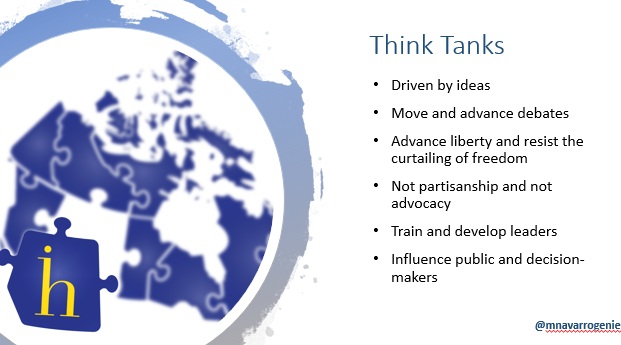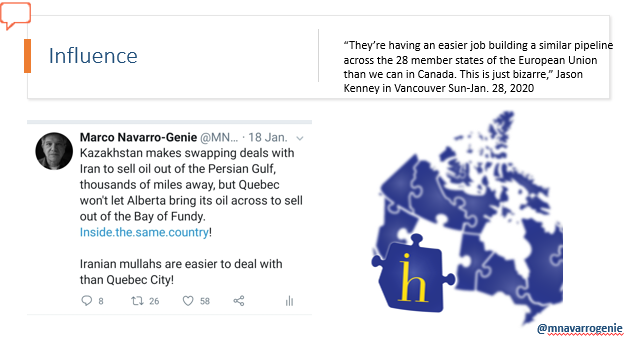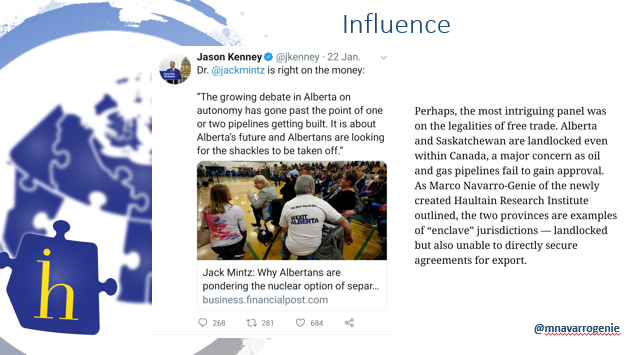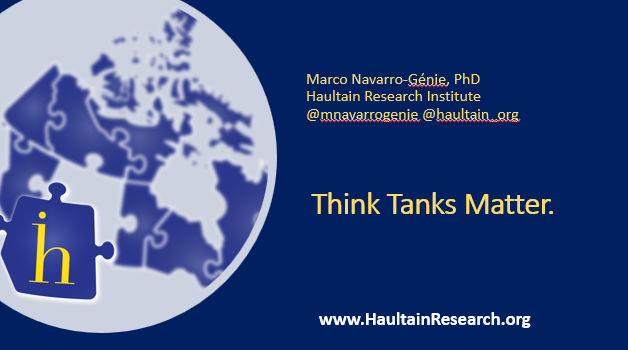Think Tank Influence (2020 Jan 28).
By Marco Navarro-Génie, President of the Haultain Research Institute.[1]
Good evening. Thanks Gerard Lucyshyn and Peter Holle for the invitation to be here. It’s a pleasure to be here as the president of the newest stars in the constellation of Alberta think tanks, the Haultain Research Institute, while I remain proud of my connection to Frontier as senior fellow.
Ideas matter! No one acts meaningfully without being consciously or unconsciously being propelled by ideas. And Ideas are the currency of think tanks.
Since Friedreich Hegel in the late 18th and early 19th Centuries, we have become most aware that the world is powered by ideas, and the most sophisticated webs of ideas tend to be the most influential. Hegel is the most influential European philosopher since Thomas Aquinas in the 13th Century.
Ideas can be communicated with words and sounds, images and gestures, in songs and paintings, and all other mediums.
Demonstrating think tank influence is almost like tracking influenza, except that tracking influenza is a lot easier.

Think Tanks are organizations that come in a variety of forms and models, but their general goal is to generate ideas and data, arguments and imagery that will seed public debates, influence discourse. New options for policy; ways to do thing better.
Anyone who has been around elected officials, with some exceptions, know that the good ones go 16 hours a day, and mired in action seldom have the time to think about new ideas. We have one these exceptions tonight with us. He works 16 hours a day but still manages to remain quite thoughtful.
The idea of think tanks is predicated on the freedom to persuade, and the freedom to persuade requires the freedom to express one’s opinions. So typically, think tanks proliferate in free societies. There aren’t a great many think tanks in Saudi Arabia, Cuba or North Korea. But there are some. Mises Cuba has recently seen two of their members detained and later sent to a maximum-security prison for political dissidents. CEDICE in Venezuela are constantly persecuted, some are in prison and some have fled the country. The jobs of think tanks in such societies is for keeps and people regularly risk their lives.
But there are prices to pay here too, though surely not as high. Being in the public eye has a price and one is subject to abuse from various quarters. Sometimes, there are permanent quarantines. When I worked at Mount Royal University, I heard colleagues semi openly talk, when someone who had applied for a job from a market-oriented think-tank, but they would not even consider him though he may have been partially more qualified than some of the people in the hiring committee. I myself tried to get adjunct status at Dalhousie for 5 years while I lived in Halifax, and I was doing it through the office of the university’s president no less, but to no avail.
In many respects, some of the better think tanks are accomplishing the tasks that many universities have vacated. That is, defend freedom to think and write, produce relevant ideas for the improvement of our societies. This is space that the social science and humanities have largely abandoned.
Think Tanks are not partisan advocates. Most of us working on policy have partisan preferences, but we do not advocate for one party or another. We promote ideas, and in the case of these here tonight, they would promote market-oriented ideas, which are often labelled right-wing or conservative, depending on the context. I think the self-referential term we would agree to use for the most part is Libertarian because we’re partisans of liberty.
This has policy implications, the most fundamental of which is seeking solutions that require less government, and by extension less of the tools that allow governments to grow larger and larger. Less taxes, less public servants, less policy intrusions, less planning from the centre. At the DNA of market-oriented think tanks there is an aversion to greater central planning, which is the bureaucratic concept most inimical to liberty.

A most important part of the contribution of think tanks is the preservation and expansion of spaces in the public arena for meaningful and rational exchanges to take place. Think-tanks create bubbles of liberty and civility –we have one right here tonight—in which ideas and solutions that can sometimes be unpopular can be transacted. This matters most in light of the illiberal trends in our society. Just this week, the federal government has moved even further into regulating speech, an appalling development in a free society. I expect all of us up here will be suiting up for the battle to come on this front.
Some in the constellation of think tanks have gone into politics. Kenney and Harper being the most notorious in Canada. And one Maritimer mulling entering the race for the conservative leadership once worked for the CTF and worked for me at AIMS. This is another and perhaps the clearest way in which think tanks have influence.
Some have influence by acting as kind of incubators of talent. Many of us at some point have worked for CTF, and some of us here have worked for Frontier. Frontier has spawned a few alumni, from which I am one and Peter M., is another. This is particularly true in the US, where governments in waiting spend their time formulating policy and exploring policy options at think tanks. Not a great tradition of this in Canada.
Many examples of direct influence. Cardus and the now defunct Office of Religious Freedom. Influence on policy is sometimes less direct but we know there are connections. Demonstrating this kind of link is devoid of modesty –and I apologise about that.

But let me make the immodest point using just a couple of recent examples with Haultain material.
- Similarities of discourse and imagery between my Tweet on Jan 18 and statement published from Premier Kenney a few days later in the VanSun. It could be just a total coincidence but the premier does follow me on Twitter. It happens to be my most successful Tweet to date with 26 TRs and 57 likes thanks to Sheila Gunn-Reid
- Jack Mintz’s column in the FP after the Value of Alberta Conference. Jack is an eminent Canadian economist. Twitted by the premier.
Considering that the thousands of NP readers had never heard of Haultain before, this was a big deal. It seems to have teased Brian Crowley enough to snoop on my LinkedIn profile.
What does Haultain do:
Solutions for landlocked Territories –Kazakhstan example. Two provinces in Canada: Alberta and Saskatchewan. Visit www.HaultainResearch.org
The Haultain Institute is a non-profit educational organization dedicated to finding solutions to address the structural inequities detrimental to landlocked Canadian provinces with views to establish more fair, balanced and renewed societies.
Who was Haultain: See here for the legacy of Sir Frederick Haultain.
The Haultain Research Institute is a not-for profit organization. We rely on the good will and donations of the interested public. Visit our page: HaultainResearch.org
Feel free to hit the contribution button and help us do the work we do in developing ideas and solutions for a more prosperous Alberta and Saskatchewan.
[1] This is the text of a presentation delivered at the Carriage Inn in Calgary on 28 January 2020. The topic of the panel at a Frontier Centre event was Think-Tank Influence. It is provided as a courtesy by request, and must not be distributed or publicly quoted without the explicit and written permission of the author: [email protected]



